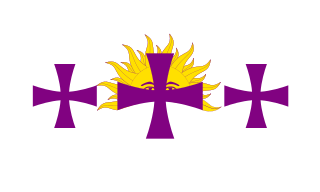Related Research Articles

Admiral-General Luis Carrero Blanco was a Spanish Navy officer and politician. A long-time confidant and right-hand man of dictator Francisco Franco, Carrero served as Spain's Premier. Upon graduating from the naval academy Carrero Blanco participated in the Rif War, and later the Spanish Civil War, in which he supported the Rebel faction. He became one of the most prominent figures in the Francoist dictatorship's power structure and held throughout his career a number of high-ranking offices such as those of Undersecretary of the Presidency from 1941 to 1967 and Franco's deputy from 1967 to 1973. He also was the main drafter behind the 1947 Law of Succession to the Headship of the State. Franco handpicked him as his successor in the role of head of government, with Carrero thereby taking office in June 1973.

Hispanidad is a Spanish term describing a shared cultural, linguistic, or political identity among speakers of the Spanish language or members of the Hispanic diaspora. The term can have various, different implications and meanings depending on the regional, socio-political, or cultural context in which it is used.

Aurora Matilde Gómez Camus was a Spanish poet from Cantabria who also wrote non-fiction.

The 498 Spanish Martyrs are a group of murder victims in the Spanish Civil War who were beatified by the Catholic Church in October 2007 by Pope Benedict XVI. They originated from many parts of Spain. Their ages ranged from 16 years to 78 years old. Although almost 500 persons, they are only a small part of the Martyrs of the Spanish Civil War.
Vladimir Efimovich Gorev, known as Vladimir Gorev, was a Belarusian soldier known to have participated in the defense of Madrid as a Soviet military advisor during the Spanish Civil War. He was born in 1900 in Velizh, Vitebsk Governorate. He was of Belarusian ethnicity.

The National Council of the Movement, was an institution of the Franco dictatorship of a collegiate nature, which was subordinated to the Head of State. Originally created under the name of the National Council of FET and the JONS on 19 October 1937 in the midst of the Civil War, it would continue to exist until 1977, following the death of Francisco Franco and the dismantling of institutions of his regime.
José García Vayas was a Spanish soldier who remained loyal to the Second Spanish Republic during the Spanish Civil War (1936–39), during which he commanded the forces in Santander. After the civil war he was forced into exile in France.
The 25th Division was one of the divisions of the Spanish Republican Army that were organized during the Spanish Civil War on the basis of the Mixed Brigades. It participated in the battles of Huesca, Belchite, Teruel and Levante.
The 28th Division was one of the divisions of the Spanish Republican Army that were organized during the Spanish Civil War on the basis of the Mixed Brigades. It was deployed on the Aragon and Segre fronts.
The XVI Army Corps was a military formation of the Spanish Republican Army that fought in the Spanish Civil War. It had an outstanding performance in the Levante campaign.
The 5th Division was one of the divisions of the People's Army of the Republic that were organized during the Spanish Civil War on the basis of the Mixed Brigades. It was deployed on the Madrid and Levante fronts.
The 20th Division was one of the divisions of the People's Army of the Republic that were organized during the Spanish Civil War on the basis of the Mixed Brigades. Situated on the Andalusian front, the division played a minor role.
The 54th Division was one of the divisions of the People's Army of the Republic that were organized during the Spanish Civil War on the basis of the Mixed Brigades. It came to operate on the Levante front.
The 104th Mixed Brigade was a unit of the Spanish Republican Army created during the Spanish Civil War. Throughout the war it acted on the Extremadura, Aragon and Catalonia fronts.

Francisco de Paula de Ceballos and Vargas was a Spanish Lieutenant General who acted as captain general in Catalonia and Cuba. He was also Senator for life as Senator, representing Santander Province.
References
- 1 2 "Zona de guerra: Espana y la revolucion cubana (1960–1962)". Duke University Press. Retrieved 2007-04-26.
- 1 2 Aub, Max (2000). Campo de los almendros. Editorial Castalia. p. 204. ISBN 84-7039-858-X.
- ↑ "Batalla de Santander". OdB GCE. Retrieved 2007-04-26.
- ↑ "Memoria republicana". Archived from the original on 2007-02-18. Retrieved 2007-04-26.
- 1 2 "Un hombre que tuvo tres nombres". Mercedes Rodríguez García. Retrieved 2007-04-26.
- ↑ ""Te llamarás Ángel, Ángel Martínez Riosola" (given by Fidel Castro)". Mercedes Rodríguez García. Retrieved 2007-04-26.